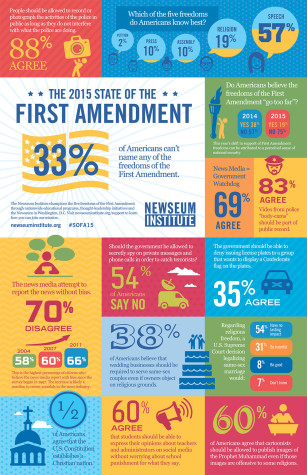First Amendment Rights Beyond the Schoolhouse Gate
October 19, 2015

tA Supreme Court case from 1969, Tinker v. Des Moines, claimed, “It can hardly be argued that either students or teachers shed their constitutional rights to freedom of speech or expression at the schoolhouse gate.” In a nation built on “certain inalienable rights,” do Joliet West students retain these rights of speech and expression when they enter the building?
“[A]s far as my classroom, freedom of speech is huge, because you want kids to be able to have their own opinions on topics,” said Joliet West world affairs teacher Peter Nackovic.
Daniel Tito, another Joliet West World Affairs teacher and and one of the school’s sophomore football coaches, agreed.
“Speech probably is the most important, just because it’s the one that’s used the most,” he said. “Religion, I believe, is also very important … I think, as far as schools go, those are the two most important.”
Nackovic expressed, “Part of the reason I can do my job the way I can is because … we’re allowed those freedoms in our Constitution.”
A recent infographic by the Newseum Institute, called “The 2015 State of the First Amendment,” discussed freedom of speech in more detail with a fact about students’ ability to express themselves on social media.
It stated, “60 percent agree that students should be able to express their opinions about teachers and administrators on social media without worrying about school punishment for what they say.”
Tito agreed that students should be able to express their opinions, but in a constructive way.
“One of the things that I tell my students on the first day, and as a coach as well, you can think and feel whatever you want about me, and I’m open for you to come and tell me about it, but it needs to be the right time,” Tito said. “The middle of the game is not the time to be telling me that you should be starting.”
According to the Joliet West student handbook, “…[S]chool administration may request or require a student to provide … [information] in order to gain access to the student’s account or profile on a social networking website if there is reasonable cause.”
“I think students need to be kind of smart about what they’re doing, and it always comes back to, especially in a school of 3,000 kids, we’ve got to keep people safe,” Nackovic said.
Tito added, “I know that many fights have been stopped because students have posted on social media and the deans have been able to stop it before it happened.”
Teachers and administrators see safety as a valid reason for limiting students’ freedoms, but some students feel these limitations go too far.
“Although we’re able to talk about what we want … if we say something wrong that a teacher or an administrator doesn’t like we’re probably going to end up getting in trouble with the school,” said Joliet West junior Hope Taques.
Courtney Rubino, Tiger Tales co-editor-in-chief, agreed.
“I feel like we mostly have freedom [in the newspaper], but we have to watch what we say sometimes because we get backlash from teachers,” Rubino said.
According to Jenn Galloy, journalism teacher and advisor for Tiger Tales, editors-in-chief review newspaper content for appropriateness, but the content is not censored or subject to prior review by the school before publication.
*story originally published on The Mash Insider http://themash.com/insider/2015/09/17/first-amendment-rights-beyond-schoolhouse-gate/

